#also he has a executive producer credit as well!
Explore tagged Tumblr posts
Text

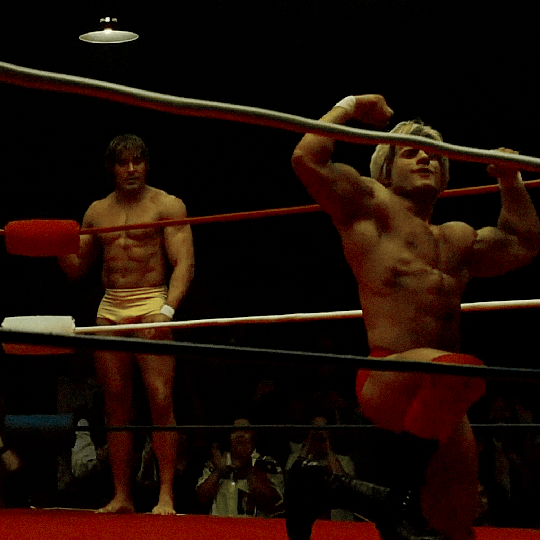
Maxwell Jacob Friedman as Lance Von Erich from The Iron Claw (2024), dir. Sean Durkin
#the iron claw#sean durkin#mjf#maxwell jacob friedman#aewedit#watched this with my bf today. Good movie!#MJF's only scene was this though#also he has a executive producer credit as well!
262 notes
·
View notes
Text
Over the past 13 years, Tom Hiddleston has died more times than he can recall. “Let me think about this,” the actor tells us, pausing to count in his head. “I think, officially, there were two big ones.”
He’s referring to his many exits from the Marvel Cinematic Universe, the blockbuster franchise in which he’s played shape-shifting Norse god Loki Laufeyson since Kenneth Branagh’s 2011 film “Thor”—the son of Asgardians Odin (Anthony Hopkins) and Frigga (Rene Russo), and the half-sibling of Thor (Chris Hemsworth), the god of thunder.
The character has since bounced between villain and reluctant antihero across five films, a handful of post-credits scenes, and Michael Waldron’s Disney+ spinoff series “Loki,” which Hiddleston also executive produces. The show wrapped its second—and supposedly final—season last November. The finale presents an end for the character, but not one of the aforementioned “big ones.”
Hiddleston’s first “official” farewell came in Alan Taylor’s 2013 sequel “Thor: The Dark World,” which saw the god of mischief take a sword to the chest to save his beefy brother. “As written in the first script, it was a true sacrifice,” Hiddleston says. Unfortunately for Marvel’s long-term plans, the actor had done too good a job playing the trickster.
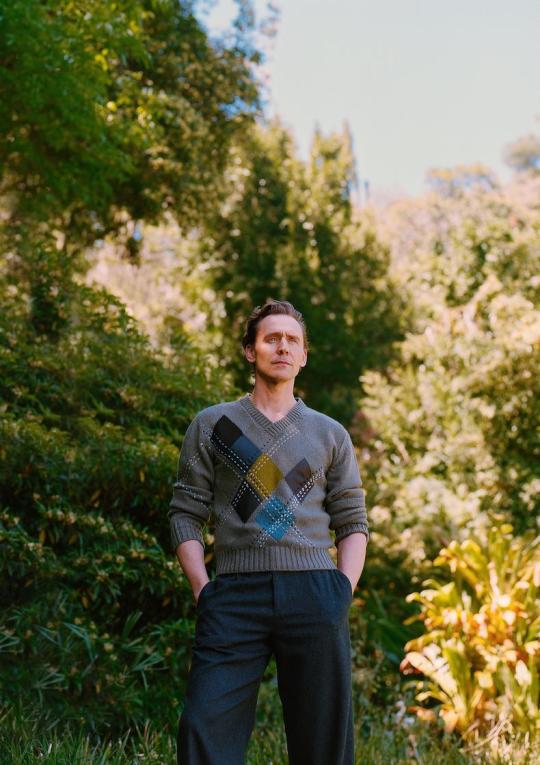
“When Marvel [executives] were testing the movie, they’d given [viewers] questionnaires that said, ‘Is there anything you didn’t understand?’ ” he remembers. “Literally every single audience member said, ‘Well, obviously, Loki’s not really dead.’ ”
In classic comic-book fashion, the character did return, gallivanting alongside his brother in Taika Waititi’s 2017 follow-up “Thor: Ragnarok.” He died again one year later (“big one” number two) in the Russo brothers’ “Avengers: Infinity War.” There were no smokescreens or questionnaires this time; audiences watched as Loki’s neck was crushed by the purple fist of intergalactic warlord Thanos (Josh Brolin).
Hiddleston remembers arriving in Atlanta to shoot his final scene and immediately bumping into Brolin. “He came up to me, gave me this huge hug, and said, ‘I’m so sorry, man.’ ”
He meant it, too; everyone meant it. The sun, it seemed, had actually set on Hiddleston’s MCU journey. “At the end of that scene, I got a big round of applause, and everybody was so sweet and kind and gracious,” he says. “I got notes and emails saying, ‘Tom, you’ve done so much for us—what a journey. Come and see us anytime.’ I really thought that was the end.”
And it was, for real, right up until it wasn’t—when the time-traveling shenanigans of 2019’s “Avengers: Endgame” blasted a younger version of Loki out of the established canon and into his own series. Over two seasons, the multiversal storyline envisions the title character as a figure who exists outside time and space. Across all there is, was, and may come to pass, there will always be a Loki, in some form, wreaking havoc.
Hiddleston has long since accepted what this means for him as an actor. Maybe “Loki” Season 2 really was his last time in the role; or maybe he’ll play him until the sun burns out. “I’ve realized that, in human consciousness, that’s who Loki is,” he says. “Loki is this ancient, mythic character, who, in our collective mythology, represents the trickster, the transgressor, the boundary-crosser, the shape-shifter—somebody who’s mercurial and spontaneous and unpredictable who will always confound your expectations and wriggle out from underneath your certainties and convictions. Someone who we need and [who] is necessary.”
Hiddleston pauses, getting emotional. “Maybe Loki escaping death a couple of times is sort of an emblem of who he is in our culture,” he says, grinning at his own gusto. The actor has a habit of being self-deprecating about the depth of the character’s lore. “I spend a lot of time thinking about Loki. You can probably tell.”
You can tell, and it’s incredibly endearing. Talking to Hiddleston about Loki feels like discussing Shakespeare’s Richard III with Laurence Olivier or Tennessee Williams’ Blanche DuBois with Jessica Lange. They were actors who put their definitive stamps on those roles by returning to the well and constantly digging deeper.
In conversation, Hiddleston is equally as likely to reference comic-book arcs as he is the ancient, anonymous Old Norse scribes of the “Poetic Edda” or Richard Wagner’s epic four-cycle opera “Der Ring des Nibelungen.” He speaks reverently of actors who embodied the trickster god before him, like Jim Carrey in Chuck Russell’s 1994 comedy “The Mask” and Alan Cumming in Lawrence Guterman’s 2005 sequel, “Son of the Mask.” He also heaps praise on those who played the part after him, such as his “Loki” costars Sophia Di Martino, Richard E. Grant, Deobia Oparei, and—in one very surreal Season 1 moment—“some alligator they found somewhere.” He cites legendary Marvel creators Stan Lee, Jack Kirby, and Walter Simonson alongside the likes of English essayist Walter Pater and Irish playwright George Bernard Shaw, who once wrote of life as a “splendid torch” to keep burning for those who follow.
“Loki is ‘a sort of splendid torch which I have got hold of for the moment,’ ” Hiddleston quotes, “and I want to make it burn as brightly as I can before passing it on to future generations.”
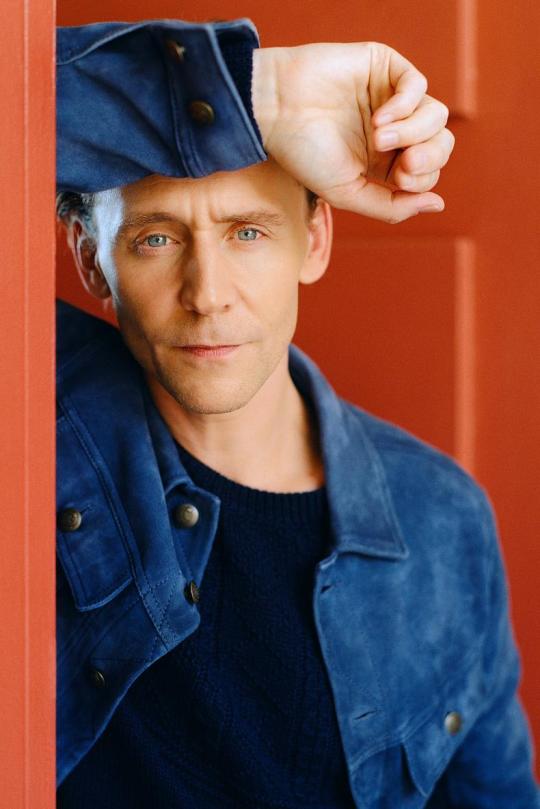
This level of study started before he even landed the role. He recalls the 24 hours leading up to his “Thor” audition, when he was 28 years old. After graduating from the Royal Academy of Dramatic Art in 2005, he quickly earned small-screen and stage acclaim—but he hadn’t yet achieved a major breakthrough. When he received the script for “Thor,” it felt familiar. “I remember thinking, This is almost Shakespearean, this language,” Hiddleston says. “What’s the best example I can [look to] of an actor who managed to humanize and make real this elevated world of myth?”
He found the answer in Christopher Reeve, who played the title role in Richard Donner’s 1978 blockbuster “Superman.” “He’s masterful in that film,” Hiddleston says. “In a way, it’s a similar premise: He’s a god or he’s a being from a different realm, and it’s not naturalistic in the way that we might expect. He does it so truthfully, and it’s so clear and clean and open and honest. I thought, If I can even approximate or get close to the kind of clarity that Christopher Reeve had in those films, I’ll be lucky.”
And then, the morning of his “Thor” audition, Hiddleston went for a run, “which is my habit before doing anything unusual,” he explains.
Running has remained a constant throughout the actor’s MCU tenure. At any given moment over the last decade, the god of mischief was likely doing laps around Marvel’s go-to shooting location, Pinewood Studios (now Trilith Studios) in Atlanta. “Life is movement; I really believe that,” Hiddleston says.
“I find when I’m running or walking, the repetitive nature of it relaxes the mind and allows ideas and inspiration to come from a deeper place. I see my work as an actor—especially in preparation for a project or a scene—as almost preparing myself to be open and ready to receive ideas, to receive energy from other actors, to receive energy from my imagination.”
Hiddleston found the technique particularly helpful when he was filming a scene for the “Loki” series premiere that he calls “one of the most thrilling challenges I’ve ever had as an actor.” In it, Loki has been poached from the flow of time itself by the temporality-policing Time Variance Authority and forced to watch what is, essentially, a highlight reel of his entire MCU arc. It’s one of the most deeply existential moments you’ll ever find streaming alongside the likes of “Bluey” and the “Cars” movies. Here is a man watching the sum total of his life—his hopes, his dreams, his failures, his own death—play out in a 30-second clip that ends with the cold, clinical words: “End of file.”
“I just kept imagining: If you were afforded the opportunity or forced to watch your own death as a bystander, it would bring about an existential shock and crisis unlike any other,” Hiddleston explains. “It was a scene where I thought, I don’t have a reference for how to play this. I just have to allow shock, disgust, disgrace, shame, disbelief, acceptance, incredulity, and sorrow to exist in the center of me.”
As an executive producer on the series, Hiddleston had a say as to which of Loki’s many misdeeds would play in the sequence. He chose clips like Frigga’s death in “Thor: The Dark World” and his father’s final words in “Thor: Ragnarok”—moments Hiddleston knew would most fill the character with regret. As production was preparing to shoot the scene, he asked first assistant director Richard Graves for a 20-minute warning.
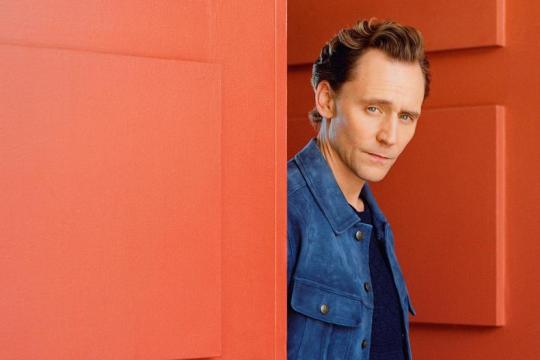
“I decided to jog around the stage and internalize as many of those memories of those people, those characters, those actors [as possible]—to try and find the center of my own vulnerability,” Hiddleston says. “Part of the joy of it was just going back to basics, trying to simplify this very complex thing…. Go for a jog, get into your body, allow yourself to be open, and just be there; just feel it.”
One “Loki”-like time jump later, Hiddleston found himself in a similar situation as he was preparing to shoot his final moment of Season 2—a scene that effectively caps Loki’s 13-year arc. Across 12 episodes, the show guided its title character toward a truly heroic end: With all of existence on the verge of collapse, he steps out of time to tie the strands of every reality together. As the credits roll, Loki sits at the center of time, holding in place all that is—alone.
It’s a lot for any actor to internalize, especially one who’s performing solo in front of a blue screen. With 45 minutes to cameras rolling, episode co-director Aaron Moorhead made a suggestion. “He said to me, ‘Why don’t you go back, if you can bear it, and watch some of your work [over] the last 15 years?’ ” Hiddleston remembers. “ ‘Take it in, see what it means to you, and then carry it when you step out onto the stage.’ ”
The actor took Moorhead’s advice to heart. And suddenly, without meaning to, he was mirroring the moment that started the series: absorbing the sum total of Loki’s MCU run. But this time, his regret had been replaced with gratitude. Hiddleston watched clips from “Thor,” remembering a time when he and Hemsworth had yet to ascend to the A-list. He recalled working with powerhouses like Hopkins and Russo, and the bonds he forged with the “original six Avengers” in 2011. He thought about how fun it was to film “Thor: Ragnarok” with Tessa Thompson and Jeff Goldblum, and of the more recent friendships he found with his “Loki” castmates Di Martino and Owen Wilson.
“I thought, What Loki is doing, he is doing for his friends. And so, Tom, why don’t you do it for your friends?” Hiddleston says. “That’s where the two of us met in that moment. And then I was so grateful I had this most amazing crew, and we did it together.”
The actor is, of course, noncommittal as to whether this is actually the end of his MCU run. The franchise is scheduled out until at least 2027, and Hemsworth has mentioned his desire to make another “Thor” film. And if Loki’s past has proven anything, even the most official endings can be undone.
Either way, it seems to Hiddleston that something significant has ended, even if it’s just Loki’s full-circle arc. “I hope it feels redemptive because his broken soul is partially healed; and you see that this character, who is capable of love, has made a decision from and for love,” he says. The actor cites the “beautiful prologue” of the first “Thor” film, in which Hopkins’ Odin tells his two sons: “Only one of you can ascend to the throne, but both of you were born to be kings.”
“At the end of Season 2, Loki is sitting on a kind of throne; but it’s not arrived in the shape he expected, and there’s no glory in it,” Hiddleston explains. “There’s a kind of burden, and he’s alone. He’s doing it for his friends, but he has to stay there without them. There’s a poetic melancholy there which I found very moving.”
For now, Hiddleston “can’t even conceive” of his life without Loki. He only hopes that he’s lived up to his guiding ethos as an actor, which he sums up with a plea from E.M. Forster’s 1910 novel “Howards End”: “Only connect the prose and the passion, and both will be exalted, and human love will be seen at its height.”
“The feedback loop for actors is that we get to inhabit a fiction,” Hiddleston says. “But hopefully, that fiction bears the shape of a truth that we recognize about life—that what we do reflects the ups and downs, the peaks and troughs, and the breadth and profundity of all of our lives.”
Hiddleston exists in that space between fiction and reality, the work and the resulting art, the prose and the passion. Long after we’ve moved on from our interview and started casually discussing the cherry blossoms blooming in New York, his eyes light up. He’s made another connection, remembered one more thing—just one last thing he’d like to impart about Loki.
He spends a lot of time thinking about Loki. You can probably tell.
“I’m so aware that the reason I’ve been able to play him for so long is because of the audience’s curiosity and passion,” Hiddleston says. “I’ve been delighted to find that for a character of such stature, he’s remarkably human. Many of the characteristics that people connect to in Loki are deeply human feelings. That’s been the pleasure, is infusing this elevated character with humanity.”
Even then, honestly, it feels as if Hiddleston, like Loki, could go on forever. Unfortunately, outside of the MCU, time moves in only one direction. Once again, he has to run.
This story originally appeared in the June 6 issue of Backstage Magazine. Subscribe to In the Envelope: The Actor's Podcast to hear our full conversation with Hiddleston (out 6/6).
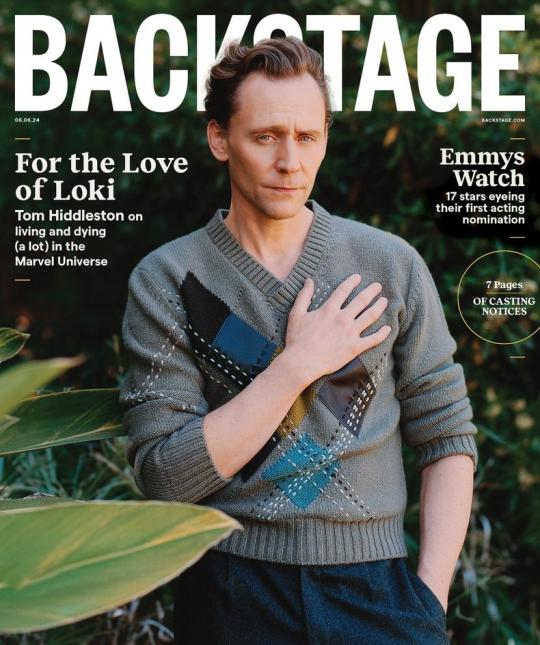
152 notes
·
View notes
Text
Jared Padalecki Reflects on His 24-Year TV Run (‘I’m Pretty Tired’) and What’s Not Next After Walker Ends
“I’m grateful. Like, I’m not digging ditches. I’m not doing Red Cross work and saving human beings. But yeah, I’m pretty tired,” Padalecki says, adding that he’s “a little disillusioned about the state of the industry that I’ve loved and been employed with for 24 years. So I have a lot of thinking to do, and I have a lot of time to be with my wife and our kids, my friends, and think about where this industry is.”
Below, Padalecki opens up about Walker’s cancellation and why he doesn’t see another long-running TV series in his future.
TVLINE | Obviously, Supernatural was on a lot longer than Walker, but you were an executive producer on Walker, and you seemed to really bond with not only the cast but also the character of Cordell. So how has this letting go experience compared to that of Supernatural for you? With my experience on Gilmore Girls and Supernatural, we found ourselves in a similar situation, like around Seasons 3 and/or 4, where we were on the bubble, or there was a network change, or the head of the network changed, or there was a strike, or et cetera, et cetera, et cetera. So we didn’t know if we’d make it, and in both cases, the network believed in us and let us go as long as we wanted, and now, they’re like two of the top 10 most watched shows on Netflix, worldwide, every year. So I kind of, stupid me, I was hoping and assuming the same might happen… I knew there was a chance. There’s always a chance that the show’s not going to go, but I was like, “Well, we’re still the most watched. We’re not expensive.” So I didn’t know what to expect, and I haven’t yet had time to have closure with Walker.
With Supernatural, Jensen [Ackles] and I talked about it in our trailers on set for years, or during conventions in the green room, or at home, or flying together, or whatever, playing golf. We’d talk about it, and finally, Season 14, we kind of looked at each other, and we were like, “Hey, you know what, I think it’s time to go back to our families.” “Yeah, I think you’re right.” So we met with [CW President] Mark Pedowitz and said, like, “Hey, we’re going to do Season 15, but that’s it.” So we had a couple years, and we, ultimately, made the decision. I left Gilmore Girls to do Supernatural. Jensen and I decided to go ahead and let Supernatural end and give it a good send-off.
That was not the same situation with Walker, obviously. So I’m still kind of dealing with it, to be honest with you. I love the show. I’m so grateful for the four years that we had. I think back to during the pandemic, we were one of the first shows to go back to filming after COVID. We shot in October of 2020, and it was still masks and six feet away. There was just so much everybody went through: car accidents, and more COVIDs, and strep, and flu, and births, and deaths, and marriages, and divorces, and another strike, and this and that. So we had gone through so much together. We had weathered so many storms that I figured we had a lot more storms to weather. It’s not the way it worked out. But right now, I’m really focusing on how grateful I am, and will forever be, for the time I got to spend on Walker.
TVLINE | Given the circumstances, how do you feel about how the series ended and how the storylines were left off in the finale? To the credit of CW and CBS [Studios], when we shot the finale, when it was written, we didn’t know whether or not we were going to go for a fifth or further season, and they did not push us to try and wrap things up in a tidy little bow, which would’ve been really bad storytelling and a really bad episode. They kind of said, “Write the best episode you can. We don’t know if it’s going to go five years, or 10 years, or 30 years, or four years. So make it the best you can.” We knew, and [showrunner] Anna [Fricke] knew, and Blythe Ann Johnson knew — they wrote the finale together — that it was possible [it would end]. So when I think back on the finale, I think whether it was the end of Season 4 or the end of Season 104, I would’ve wanted all the characters to have a light at the end of the proverbial tunnel, something to look forward to. And so, all the characters get a send-off and a salute of sorts, but it feels like a proper episode of television. It doesn’t feel like, “Oh, they are in a diner, and let’s just turn the cameras off.” But again, it’s so difficult to end. When you fall in love with a character, or several characters, or a story, for 69 episodes, like how do you end it?
So I’m grateful that we were able to create the best episode that we could without any incumbrances of like, “You better make sure everybody dies, or everybody gets a new job,” or something. Because how could you possibly end the story of all the Walkers and all their friends and been like, “Oh, yup, cool, don’t need to see them anymore”? Like, no matter how it ended, I would’ve wanted to see more of them, and so I’m very proud of the episode.
TVLINE | You went from Gilmore Girls straight to 15 seasons of Supernatural to Walker. Are you exhausted yet? I was exhausted 20 years ago. [Laughs] I am. I am exhausted. When I found out that Walker was not going to go for a fifth season, that was on a Tuesday, and I left for Europe on a Friday, part work, part fun. But I was in Europe for like three and a half weeks with family and a little bit of work, a lot of travel. So I’ve only been in the United States four days in the last month, and so, I haven’t really had time to fully grasp it. But yes, I’m tired. I’m tired. I’m grateful. Like, I’m not digging ditches. I’m not doing Red Cross work and saving human beings. But yeah, I’m pretty tired. I’m a little disillusioned about the state of the industry that I’ve loved and been employed with for 24 years. So I have a lot of thinking to do, and I have a lot of time to be with my wife and our kids, my friends, and think about where this industry is.
I haven’t had time to really reassess my life. I got into this industry when I was 17 years old on Gilmore Girls, and I, at the time, had my school schedule for UT Austin, and so, I thought I was going to do a couple episodes and go back to UT and pay off some student loans or something. That was 24 years ago, so I haven’t really had the time. And even during the writers’ strike in ’08, we were just waiting for it to end to go back and shoot Supernatural. The pandemic in 2020, I was just waiting for it to end, so I could go finish Supernatural and start Walker. The writers’ strike last year, just waiting for it to end, so we could pick up Walker.
I was in Europe for a while, and people would come up and take a picture and get an autograph or whatever and [ask], “So what’s next?” and for the first time in my entire life, I was like, “I don’t know.” “Oh, well, surely you have stuff. What’s next?” I was like, “Well, I don’t know.” They’re like, “Oh, you can’t tell us.” “No, no. It’s not I can’t tell you. I don’t have a job waiting for me,” which I’ve never said that in my adult life. So it’s interesting, and I’m going to surround myself with family and friends and loved ones, and try and figure out if I have anything else to offer that people want, and if I can be of service in storytelling, somehow, some way, then I guess I’ll put my proverbial cowboy hat back on and saddle up.
TVLINE | When you’re ready, though, do you imagine that you will want to do another TV series? I don’t think so. I don’t mind long TV, but I’ve heard it said many times, and I agree, that hour-long episodic television is the hardest job in the industry. If you’re Elijah Wood in Lord of the Rings, and it’s three three-hour long movies or whatever, it’s still like 18 months, you know? There’s an end in sight. With TV shows, sometimes it lasts 15 years, and sometimes they say, “Hey, where do you live? OK, we’re shooting in Vancouver.” You say, “But my family, my wife and kids are in Austin.” Like, “Well, good for them. They can come move up here. Here’s a thousand bucks to fly them out.” It’s not for the weak-spirited. Like, you really have to sacrifice a lot, and I’ve sacrificed everything I have to sacrifice for many, many years, and I think I’m at a point in my life where I want to spend more time with my wife and kids. If a job on a TV show comes up, like I’ve talked to Kripke about The Boys stuff, like, “Yeah, I’ll come play with you for a month. Yeah, I’ll come play with you for two months, for six weeks, or whatever,” or, “Yeah, I’ll come pop in a week out of every month for the next three months.”
But a classic TV contract is a six-year contract. My oldest son is 12, my middle son is 10, my daughter is seven. So if I sign a six-year contract, and they’re filming in Alaska, then I miss my son getting a driver’s license, I miss him graduating high school, I miss his first girlfriend or boyfriend, his first heartbreak, his basketball games, I miss my other son’s driving test, I miss my daughter turning into a teenager, and then I’m leaving [my wife] Gen, too. It’s a big commitment. So I don’t foresee myself doing that unless, again, it was in Austin, and I was the executive producer that could be involved in knowing the show and making sure the cast and crew all did it in as efficient a way as possible.
TV LINE
143 notes
·
View notes
Text
2 things -Today is the anniversary of this interview of Alex and @GQ (November 19, 2018) and we finally have confirmation that Alex will be on the last podcast episode of “Truest Blood” which will be released on December 9, 2024. I think we all figured out that he’d be on either the first or last episode. Kristin confirmed to me yesterday he will be on in 3 weeks, which means the last episode. Thank you, Kristin!
This is only a snippet of the interview, so please go to the link in my stories to watch the whole thing. I chose this clip because he’s talking about my favorite role of his, Eric Northman in @truebloodhbo and it is actually one of the questions that Kristin and Deborah Ann Woll usually start with on their podcast: how did you get the role on True Blood? I love that in this clip he talks about Kristin a couple of times, calling her one of his “favorite people” and that he loves her more than anything. 🥰
This week the podcast is on episode 6.02 and they talked to the wonderful Chris Bauer (Andy Bellefleur). Next week they talk to writer/director/executive producer Angela Robinson who wrote the “Nerd Eric’ scenes and I cannot wait to hear what she has to say. She also wrote & directed the True Blood episode “Karma” and it turned me onto the song they chose for the end credits “Karma” by Lady Wray. I’m not sure who will be on the following week. You can listen to the fabulous Truest Blood podcast wherever you can stream podcasts as well as the HBO YouTube page. Last week they had on Ryan Kwanten (Jason Stackhouse) which is one of my favorites.
The video is called ‘Alexander Skarsgård Breaks Down His Most Iconic Characters | GQ’
GQ on YouTube: Alexander Skarsgård breaks down his most iconic characters, including his roles in 'Zoolander,' 'Melancholia,' 'Generation Kill,' 'True Blood,' 'Battle Ship,' 'The Legend of Tarzan,' 'Big Little Lies,' 'Hold the Dark,' 'Hidden' and 'The Little Drummer Girl.'
credits to HBO & GQ (my edit)
41 notes
·
View notes
Text
appreciation post for Lise Mayer!! she co-wrote The Young Ones (and The Bachelor Boys book, additional material like when they did Comic Relief, etc), which is well known. but she also wrote for other things in the alternative comedy scene like Rik Mayall and Ben Elton's comedy tour (source: BBC Breakfast Time interview)! and, something I didn't know until recently: she co-wrote/wrote for Kevin Turvey! she's not credited in his television appearances, but see below for sources.
i really loved the podcast episode she did with Alexei Sayle about TYO, you gain a lot of insight into her perspective! she also mentions misogynistic treatment like being asked to go make tea when they were doing script readings, not getting invited to a big BBC party because it was presumed she'd be Rik's plus-one, and getting groped at the BBC bar. it pissed me off on her behalf and partly prompted this post.
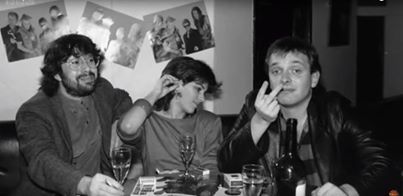
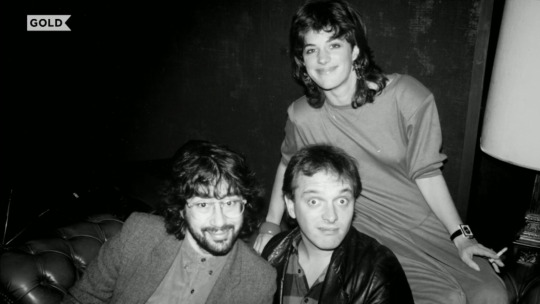
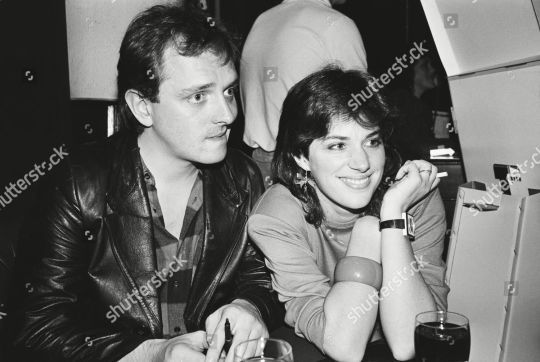
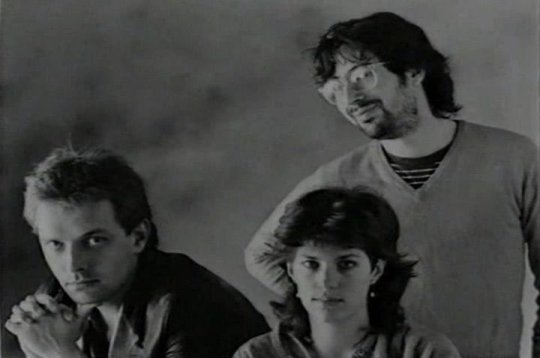
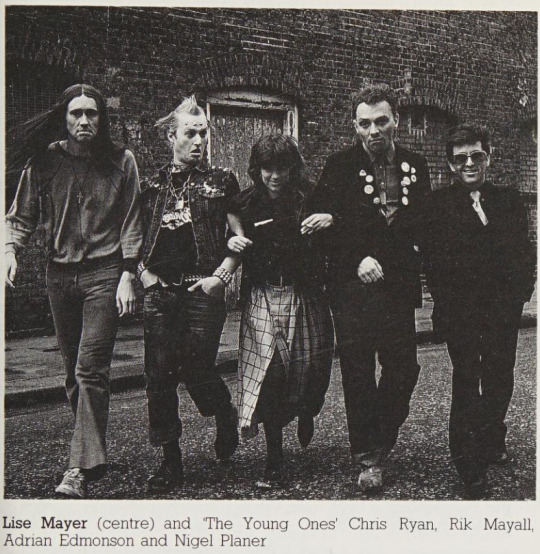
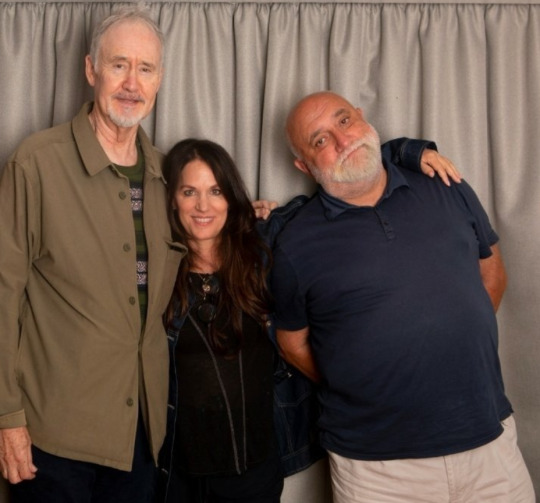
some specific accolades/accreditation/fun facts:
Rik crediting her with writing/conceiving the Kevin Turvey non-joke "All right, biting political satire: What do Lech Walesea and Menachem Begin have in common? They’ve both got foreign names! What do you mean it’s not funny?" (x)
Alexei Sayle in Thatcher Stole My Trousers crediting Lise with co-writing Turvey: "Lise was, like Linda for mine, a vital part of Rik’s career, co-writing both The Young Ones and Rik’s character Kevin Turvey..."
a 1987 source for Lise co-writing Turvey: "The assumption that women do not write comedy scripts was one with which Lise Mayer, co-writer of The Young Ones television series, has also had to contend. She started writing for Rik Mayall’s Kevin Turvey in the television series A Kick Up the Eighties..." (x)
Rowland Rivron (comedian who toured with The Comic Strip gang and lived with Rik and Lise) in What the f*** did I do last night?: "[Lise] also had the unenviable job of standing at the side of the stage when Rik was performing, and jotting down anything he said that was unscripted. If it got a laugh, it would be woven into the next night’s routine."
the only time i've ever seen a Rik Mayall/Ade Edmondson/Lise Mayer writing credit: for a poem called Distance which was collected in this anthology! Rik and Ade seem to have acted it out (or at least a version of it) in this 20th Century Coyote performance
Rik on Lise writing TYO: "‘She discovers different things: the comedy of embarrassment and awkwardness – she draws out the cheating and stealing that goes on in the house.’" (x) (Lise also says her "favorite comedy was always the comedy of embarrassment" in the Alexei Sayle podcast)
Rik: "... Lise Mayer wrote this great scene where I find a tampon in a handbag and it's my birthday party and I think it's a present because my character is Rick, who is such a git, he didn't know." (x)
Helen Lederer in Not That I'm Bitter, writing about being on The Young Ones: "[Lise] was known to be the brains behind it all, particularly the more surreal elements…"
she and Rik chose the bands (x)
Lise: “We’d have a table read at which point we’d discover that the script ran over an hour long, and then I’d have a sleepless night editing it.” Alexei: “You did that?” Lise: “Usually me, yeah…” (she later explains they'd present the script Monday and rehearsals were Tuesday, Wednesday-so she literally had one night to edit!) (x)
facts from the blu-ray commentary tracks:
Rick's yellow dungarees in Interesting were based off a picture of Lise in a similar pair
Lise wrote an essay about the tampon joke in Interesting so that the BBC didn't cut the scene (though they still edited it)
Paul Jackson (producer) credits Lise with arguing "you are seriously telling me that we cannot refer on television to something that happens to 50% of the population for about 30 years of their life? and we're not allowed to even refer to it" to make an executive back off about the tampon joke in a meeting
Lise came up with Neil's flowerpot covering in Nasty
Vyvyan/Vivian's name comes from Lise having lived in Vyvyan Terrace, Bristol
Lise thought of the cast switching costumes in Bambi (one of my favorite moments!!) (/end of commentary track facts)
this is guesswork, but i've seen Ben Elton and Rik Mayall's handwriting and i'm pretty sure the editing/handwriting on the bottom left on this script must be Lise's, which gives insight into what/how she wrote: (x)
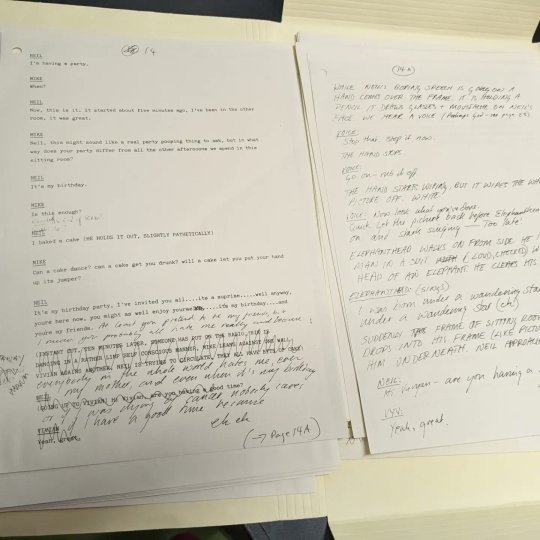
i feel like it's easy for people to overlook or minimize Lise's impact, something that happens to female creators far too often. i hate when women's identities are framed around their association to a man-girlfriend to Rik in this case-which was the norm whenever i saw Lise discussed in articles/books/online discussions about TYO. it's important to know she was a writer and co-creator with her own identity and (underappreciated) contributions. The Young Ones (and Kevin Turvey, and things we don't even know she goes uncredited for) would not have been the same—or wouldn't have even existed—without her!
#women in comedy are everything to me. lise was the one who did the typing to amalgamate the TYO scripts AND edited them down in 1 night...#women have to work so hard to prove their place in male dominated fields. she deserves her flowers!!#lise mayer#rik mayall#the young ones#kevin turvey#ben elton#britcom#in berserker! ade says vyvyan is named that because he and rik loved Vivian Stanshall#so i imagine lise gave the spelling? which is quite important i would say! just interesting to know the Full picture#also i reallyyy wanna know when Distance was actually written. it was collected in an anthology pubished in '84#but it very well couldve been written before (as other works in that book were written before 1984 as well)#basically im wondering if Lise contributed to 20th century coyote sketches?? i wouldnt be surprised bc she wrote a lot for rik
100 notes
·
View notes
Text
Sebastian Stan Talks Career Interests And His ‘A Different Man’ Film
By Jeff Conway

Sure, you likely know him for his many Marvel film appearances as Bucky Barnes, but actor Sebastian Stan has often taken “the road less traveled” when it comes to his career, having built quite the unique repertoire of memorable performances in far less conventional films.
That observation has arguably never been more visible than with his involvement in the new A24 film, A Different Man. Written & directed by Aaron Schimberg and co-starring Adam Pearson and Renate Reinsve, it tells the story of Edward (Stan), an aspiring actor who undergoes a breakthrough medical procedure to transform his facial appearance, but soon regrets his decision when he becomes obsessed with reclaiming what he has lost.

I sat down with Stan, Pearson and Schimberg to uncover the origin and the creative thought process that went into this new project, which is now playing in select theaters in New York and Los Angeles - nationwide come October 4. For filmmaker Schimberg, this purposefully uncomfortable narrative and the overall project hits rather close to home.
Schimberg said, “I mean, for me, it’s sort of a personal story. I have cleft palate and it’s just sort of me thinking about how it’s affected me in my life and others’ perception of me and my perception about myself. My previous film [Chained for Life] also dealt with the subject in some ways, so that’s sort of what I am always thinking about when I am starting to write a film. I was also thinking about Adam because I had worked with him previously and he played a shy character in Chained for Life, my last film, and he’s not shy at all - and yet, people I think sort of thought that he was playing himself in my movie because they sort of assumed that he must be shy. So, I was inspired to write something that was closer to who he is - taken to a comical extreme, maybe, and I wanted him to show off his range, but I also just wanted to work with him again, so these were some of the starting points.”

Pearson, a British actor with neurofibromatosis, which is a rare genetic disorder that typically causes benign tumors of the nerves and growths in other parts of the body, went on to share what it was about A Different Man and his Oswald character that most intrigued him to want to make this his next film.
“Well, I enjoyed working with Aaron the first time, so when he said, ‘Would you consider working with me again?’ Straight away, I was like, Ding Ding! Round two - let’s rock and roll. Then the script - all the words have weight. There’s very little wasted motion in the script. The end result of the film is quite challenging and holds up a mirror to an audience. I’ve never been a fan of hand-holding or sugar-coating. I think audiences can be a lot smarter than we often give them credit for. A good film will change what you think for a couple of days, but a great film will change how you think for the rest of your life. We’re certainly trying, at least, to be in the great film business.”
With Stan not only acting in A Different Man but also an executive producer, I wondered how he has perhaps noticed his interests and priorities towards the stories that matter most to him as a professional and human being evolving as time goes on.

Stan said, “Well, you get a little older and the questions get a little scarier. A few years ago, I just decided to kind of just be a little bit more aggressive about finding specific work that was interesting and different and kind of challenging for me than what I was getting to do. Eventually, you find yourself in conversations that are in the development of certain things and that might lead to a producing kind of aspect. I think in this [A Different Man] situation, I was involved before A24 came on, which never really happens for me. Not only because of obviously how I felt about the story and so on, I felt really brought in by Aaron and [producer] Vanessa [McDonnell] into their journey with this film and like what they were wanting to do. So, I felt a much bigger attachment than I usually do as an actor in a way.”
When it came time to film A Different Man, Stan recalls the production not having much time, which he actually found to be helpful within his producer role “because when you’re involved in some capacity beyond acting, sometimes you can kind of go, Hey, let’s continue shooting or something. You can help add more to the making of it in some capacity and that was big for us, given our time - that we didn’t have a lot of time.”

In fact, during one particular scene in the film, Stan remembers while everybody else was wrapping up the production trucks for the night, he decided to head out on the streets of New York City with his A Different Man director of photography Wyatt Garfield and Schimberg to grab additional footage. “I just kind of took one of his other little cameras and then we started going up and down Columbus Avenue. It was Friday night and we just got all these shots. Maybe you don’t always get to do that, so that was helpful.”
As I began to conclude my conversation with these three gentlemen, I wondered what Pearson and Stan would say to their A Different Man characters, Oswald and Edward, after seeing their stories play out on-screen and understanding their wants out of life.

Pearson said, “I’d be like to Oswald, Maybe turn it down a little bit. Be nicer to [Stan’s character Edward] because he might not say it, but he loves you and he needs you right now.”
As for the message Stan would tell Edward, he said, “Listen to me! I’m here - I’m telling you. I don’t know how I feel about this. Just hear me out.”
He then added: “It’s very interesting because we all have these moments in life, big or small, where you make a decision or you even say something because you’re with other people or you’re supposed to say something the right way, but you know your reaction in the moment or the decision you’re making is not what your gut is like really telling you. Then, you feel kind of like you’ve abandoned yourself, but then you just quickly deny that - that can kind of like spiral down. We’ve all kind of not owned certain things in the moment and that’s sort of what happens. He kind of drowns out that voice.”
37 notes
·
View notes
Text
Some updates about the Good Omens situation- Source: Deadline:
1. Season 3 is no longer happening. The show is now going to end with a 90 minute episode, sort of like a made for TV movie.
2. Neil Gaiman is not a part of the series finale. His production company is no longer involved.
3. A new writer is expected to finish the finale, although as of yesterday, a deal has not been finalised.
4. Rob Wilkins, representing Terry Pratchett’s estate, as well as BBC Studios Productions’ head of comedy Josh Cole will executive produce.
Although the 90 min ep is a bummer, I am happy that they took the allegations seriously. His production company being out is also a good thing.
I know the show means a lot to many people, me included. But the good thing is that we are getting an end. There will be an end. I hope it is a satisfactory end.
I also pray that all the victims are okay.
I am here if anyone wants to talk.
EDIT:
Neil Gaiman will still be credited as a writer for the series finale. So, he will benefit from the premier as well as the views. So, piracy is the way to go.
30 notes
·
View notes
Text
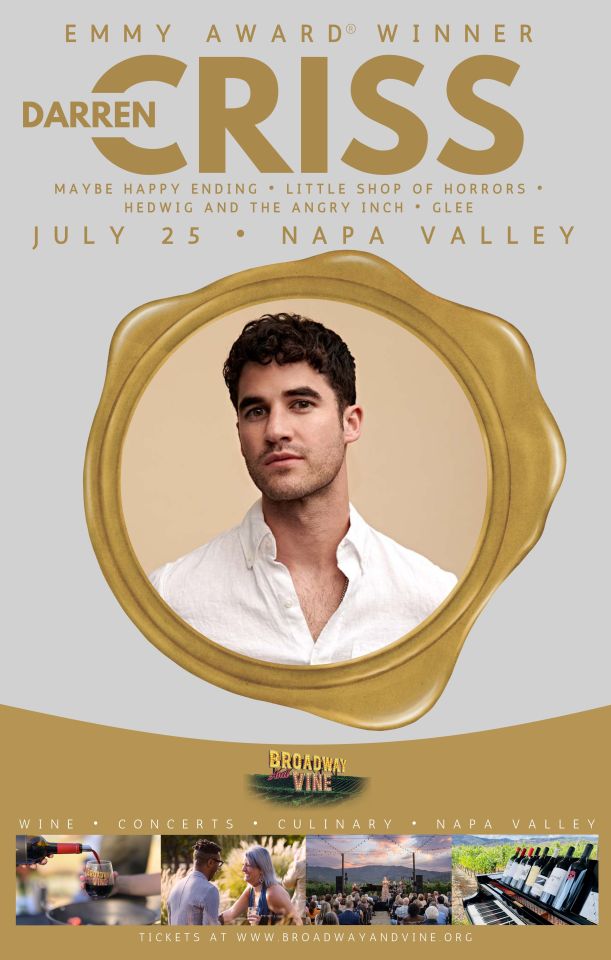
Darren Criss Live at Tre Posti Vineyards
Pre-Concert Wine Tasting Reception • Live Concert in the Vineyard • Post-Concert 3-Course Vintner's Dinner
Time & Location Jul 25, 2024, 6:00 PM Tre Posti Vineyards, 641 Main St, St Helena, CA 94574, USA
About the event Please note: Concert is at 7:30pm. Arrival time varies based on ticket type. Broadway & Vine invites you to an unforgettable evening pairing some of Napa Valley most beloved vintner's with a concert by Golden Globe, Primetime Emmy, Critic's Choice, and SAG Award Winner Darren Criss (TV: Glee, Ryan Murphy’s The Assassination of Gianni Versace: American Crime Story, Hollywood, Broadway/Off Broadway: Maybe Happy Ending, Little Shop of Horrors, American Buffalo, Hedwig and the Angry Inch (2015), How To Succeed In Business Without Really Trying) at Tre Posti's Vineyard. For this concert, Darren will be performing a playlist of songs featured throughout his wildly eclectic career as both a songwriter and performer. Supplement your concert experience with a pre-concert wine tasting reception and post concert Vintner's dinner.
Since bursting onto the pop-culture landscape over a decade ago, Darren Criss has embodied the kind of kaleidoscopic artistry that’s entirely uninhibited by form or genre. Before Darren Criss exploded into the internet’s subculture as both an actor and songwriter for the YouTube viral hit A Very Potter Musical in 2009, he had made a small name for himself playing unique interpretations of popular songs he’d perform at cafes and bars in his hometown of San Francisco. Little did he know that the same knack for covering tunes would serve him well in 2010, when he was cast on FOX’s massively successful musical series Glee, from which many of his performances of popular songs would lead to several Billboard-topping records. In 2015 his songwriting also landed an Emmy nomination for Best Original Music and Lyrics, from penning the song “This Time” for the show’s series finale.
Criss has continued to write and produce music extensively through the years, whether for his own releases as an artist or as a songwriter for theater, film & television. In 2019 Criss created, executive produced, starred in, and provided all the original songs for his short-form musical comedy series Royalties, and earlier this year provided the music & lyrics for the opening number of the 2022 Tony Awards: Act One. As an artist, he most recently delivered a genre-diverse collection of "character-driven" singles as part of his 2021 solo EP titled “Masquerade” (BMG), and in the same year, released a full-length Christmas album titled- aptly- A Very Darren Crissmas (Decca).
As an actor, Criss is a veteran of the stage whose Broadway credits include the titular role of Hedwig and the Angry Inch (2015), How To Succeed In Business Without Really Trying (2012), and the most recent 2022 revival of David Mamet’s seminal play American Buffalo alongside Laurence Fishburne and Sam Rockwell. In 2018 his work in Ryan Murphy’s The Assassination of Gianni Versace: American Crime Story received wide critical acclaim, earning him a Primetime Emmy, Golden Globe, Screen Actors Guild, and Critics’ Choice Award. He was most recently seen starring in Netflix’s hit series Hollywood, for which he also served as executive producer.”
Please Note: The event will be held outdoors at sunset and the temperature will vary. Seating is based on party size and arrival time, and is up to the discretion of the event management. No seat is greater than 35 feet from the stage in this exclusive Broadway concert experience. ALL SALES FINAL.
32 notes
·
View notes
Text
i think she knows! | karina x fem!oc smau
meet the cast: recurring cast!

synopsis. march shim and karina yu had been compared and pitted against each other for years, and the media even dubbed them as rivals simply because their careers were slightly similar. their professional lives cross when they’re both casted as leads in a new series, sparks flying both onscreen and off.
(oh—and march also runs a secret stan account for karina.)
warnings. language

— you’re the only friend i need!
(march’s friends)


yeji hwang is a famous actress and model. she’s been march’s friend since they starred in a zombie movie (“dead girl walking”) together back in 2019. she is one of her closest friends, to the point that there had been dating rumors about them.


yuna shin is an actress, model, and dancer. her first major role had been in the series, the heirs (2018) where she starred alongside march and they eventually became friends.


donghyuck lee, or better known by his professional name haechan lee, has been in the spotlight since he was a child, having been the son of a famous actor and actress. he has a half brother, mingyu kim, who is also an actor. he and march became friends through him and is one of her longest friends in the industry.


renjun huang is an actor known for starring in musicals, and sometimes does tv series and movies. currently, he is playing orpheus in “hadestown”. he and march first met on set of “after school” back in 2017, and is also one of march’s longest friends in the industry.

— for lyfers 🫦
(karina’s friends)


aeri uchinaga, known professionally as GISELLE, is an actress, singer, and businesswoman. she began her career as a child actress, then became a teen idol and musician, before eventually taking a break from music and focusing on her acting career and her cosmetic company, DOPAMINE Beauty.


minjeong kim, known professionally as winter kim, is an actress, singer, and dancer. she is currently playing eurydice in the stage musical "hadestown".


yizhuo ning, known professionally as NINGNING, is a singer-songwriter and actress. she started her career in acting in 2017 before eventually making her own music in 2020. she is also credited as a co-writer in a few songs off of karina’s album, most notably in the song “casual”.

— others!


mark lee is an actor, singer and songwriter, and music producer. he is most known for his role as peter parker in the mcu. he is known both for his acting and his music, often called an all-rounder by his peers. he is the owner of the recording studio, golden hour studios.
yangyang liu is an actor, host, and musician. he’s known for starring in comedy series and films, and is part of the regular cast of the late-night live sketch comedy variety show, “late night live”. aside from that, he also releases music on the side, his biggest hit being “end of beginning”.


wonwoo jeon is a well-known actor and filmmaker who has been dubbed as the “box office king”, since all his movies turn out to be certified hits. currently, he is working on a series (as the showrunner, producer, and headwriter) with his fiancé, mingyu kim.
mingyu kim is one of the sought after actors in the industry, and is also a director. his mother was a famous actress during her time, and he has a younger half-brother whom he is also close to. he is currently working on a limited series (as the showrunner, director, and executive producer) with his fiancé, wonwoo jeon.

PREV | MASTERLIST | NEXT

notes.
karina, giselle, winter, and ningning all met on set of the movie "dreams come true" and they've all been inseperable since then
minwon are kinda like march’s “industry parents” and they also have a production company called “bittersweet productions” bc im unoroginal and cannot think of a different name 😭
mark is basically everyone’s friend 😭 he knows a lot of people and has a lot of connections in the industry (and yes the mcu is a thing in this universe but i will not go into full detail about it… just that mark is spider-man 😵💫)
march has dating rumors with all her friends but especially with yeji and haechan bc shippers are crazyyyy like she would be standing next to anyone and there would be shippers immediately
taglist is still open!!!! and pls let me know if u wanna be a stan account in this smau bc i need more stan accounts 😭😭😭 pls im on my knees
taglist. @archivedmkl @yuyuy90 @linonyang @yjiminswallet @jaeyuuns @syronns @gtfoiydlyj
#karina x oc#karina imagines#karina scenarios#karina fluff#karina angst#karina crack#karina x reader#karina yu#yu jimin#aespa#aespa x reader#aespa smau#social media au#smau: i think she knows
18 notes
·
View notes
Text
My takeaways from todays NYCC Daryl Dixon panel
Firstly, and most importantly, Melissa McBride as series regular and executive producer in S2 🥹 about time! Also I'm really happy she's in the title now even if 'The Book of Carol' would not have been my first choice.
Secondly, I really appreciated that when Greg and Norman referred to certain scenes from S1 as "romantic", Norman made sure to clarify, in no uncertain terms, that it's not in a "love" way, and more in a French/European ambiance way. Good to see that he's not shipbaiting, and also giving the credit to Melissa as well when Zabel was praising him for certain choices, like pushing for filming to be on location in France, instead of in a studio somewhere else.
"My good friend, the talented and beautiful, Melissa McBride"🥹❤️
!Spoiler warning for below, talking about a scene from the finale!
I have not seen the scene and will not/can not describe it but I want to point out a comment that Norman made about an acting choice he made in one of the scenes that's apparently in 1x6.
So he sets up the scene as Daryl is fighting to get on a boat (presumably back to America) and said that he "tried to play Daryl with a smile on his face as he was about to get on" (paraphrasing); he knows Daryl's heart is across the ocean and no matter how much he cares for the people he has found in France, deep down he's called back to his family, specially to Judith and Carol and the promise he made to her.
And I can't wait to see the scene that the mod mentioned as Carol taking out a guy on a bike, France doesn't know what's about to hit them when she arrives ❤️
~~~~~~~~~
Also, just a thought that made me laugh but imagine Carol just got to France and Daryl's on the boat back to America... actually that wouldn't be funny at all 🫠
61 notes
·
View notes
Text
EXCLUSIVE: One year ago we told you that a second season of John le Carré adaptation The Night Manager was quietly being developed under the codename Steelworks.
Now, Deadline can reveal that the BBC and new co-pro partner Amazon have gone big on a supercharged two-season order of the thriller, with Tom Hiddleston returning to lead, Hugh Laurie coming back as EP and with a new director in I Hate Suzie’s Georgi Banks-Davies. A third season has also been greenlit. David Farr returns as writer and Stephen Garrett is showrunner.
The Night Manager Season 2 will begin filming later this year and will pick up with Hiddleston’s Jonathan Pine eight years after the explosive finale of Season 1, going beyond the original book, which was written by the celebrated British writer in 1993. Additional plot details are being kept under wraps and there is not yet confirmation as to whether EP Laurie’s Richard Roper, who was last seen in the back of a paddy wagon driven by arms buyers who were not best pleased with him, will return to star. Hiddleston will also EP and will discuss in more depth on tonight’s Jimmy Kimmel Live!
Produced by The Ink Factory in association with Character 7, Demarest Films and 127 Wall, and in co-production with Spanish partner Nostromo Pictures, The Night Manager Season 2 was sold to Amazon by Fifth Season. The first was co-produced with AMC.
New director Banks-Davies, a BAFTA-nominee who takes over from Susanne Bier, has credits including I Hate Suzie, Garfield and upcoming Netflix series Kaos.
The Night Manager Season 1 was a huge success, watched by millions and winning multiple BAFTAs, Emmys and Golden Globes including best actor for Hiddleston. Also starring Tom Hollander, Olivia Colman and Elizabeth Debicki, it followed Pine – who ran a luxury hotel in Cairo – as he attempted to infiltrate the inner circle of Roper’s crime syndicate after being hired by Foreign Office task force manager Angela Burr.
The first season was commissioned more than 10 years ago and the show has since been remade in India, lapping the UK version by swiftly having a Season 2 greenlit for Disney+ Hotstar in May last year.
Simon Cornwell and Stephen Cornwell, le Carré’s sons who run The Ink Factory, said Season 1 proved “a landmark moment for the golden era of television – uniting on-screen and behind-the-camera talent at the top of their game – and an audience reception which was beyond our wildest imagining.”
They added: “Revisiting the story of Pine also means going beyond the events of John le Carré’s original work: that is a decision we have not taken lightly, but his compelling characters and the vision David has for their next chapter were irresistible.”
Amazon MGM Studios Head of Television Vernon Sanders said: “We are elated to bring additional seasons of The Night Manager to our Prime Video customers. The combination of terrific source material, the wonderful team at The Ink Factory, a great writer in David Farr, an award-winning director in Georgi Banks-Davies, as well as the talented cast truly make the series the full package.”
Hiddleston said: “The first series of The Night Manager was one of the most creatively fulfilling projects I have ever worked on. The depth, range and complexity of Jonathan Pine was, and remains, a thrilling prospect.”
BBC content boss Charlotte Moore added: “After years of fervent speculation I’m incredibly excited to confirm that The Night Manager is returning to the BBC for two more series.”
The Night Manager series two is created and executive produced by Farr, based on the characters created by le Carré. Additional executive producers include Garrett for Character 7, Banks-Davies, Laurie and Hiddleston; Joe Tsai and Arthur Wang for 127 Wall; Stephen and Simon Cornwell, Michele Wolkoff, and Tessa Inkelaar for The Ink Factory; Adrián Guerra for Nostromo Pictures; William D. Johnson for Demarest Films, Nick Cornwell, Susanne Bier, Chris Rice for Fifth Season and Gaynor Holmes for the BBC.
#tom hiddleston#the night manager#seasons 2 and 3#official#jonathan pine#hugh laurie#booked and busy
98 notes
·
View notes
Text
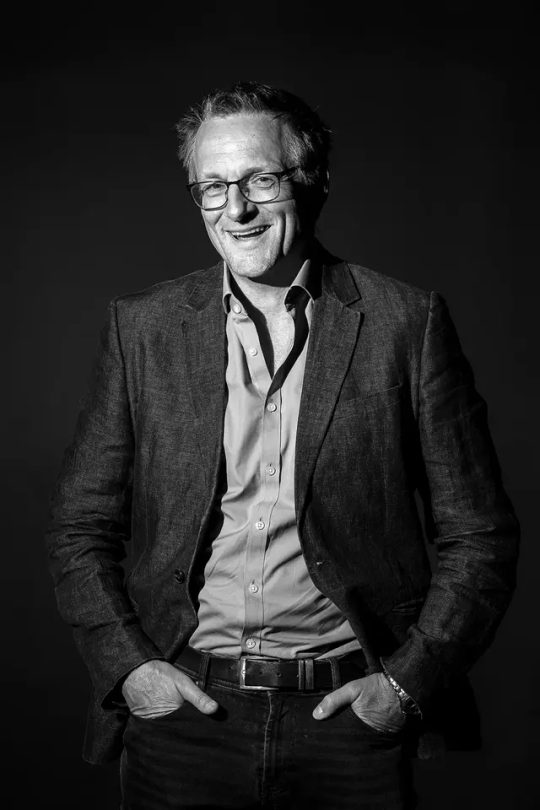
Dr Michael Mosley
Popular celebrity medic who offered health advice to millions through his TV and radio roles, most notably on fasting
Dr Michael Mosley, who has died aged 67 on the Greek island of Symi, explored health and fitness issues of interest to big audiences. He was a versatile communicator, whether as a television diet guru, newspaper columnist or podcaster.
He became a household name for diet books promoting calorie reduction and fasting, including The Fast Diet (2013), written with the journalist Mimi Spencer. His work gained in popularity from his self-experimentation, which included swallowing tapeworms, magic mushrooms, internal cameras and – most famously – fasting to cure his own type 2 diabetes, diagnosed in 2012. He became a well known TV and radio celebrity medic, regularly appearing on The One Show for the BBC and This Morning for ITV. On BBC Radio 4’s Just One Thing podcast he offered health tips to the nation, from the benefits of daily spoonfuls of olive oil to the usefulness of the plank position.
Yet his own medical career was brief. Mosley, who studied philosophy, politics and economics (PPE) at New College, Oxford, trained in medicine at the Royal Free hospital, north London, after two years of working as a banker. He wanted to become a psychiatrist, saying that he found people more interesting than finance, but was disappointed to find that “there were severe limitations to what you could do”, he told the British Medical Journal in 2004.
He opted instead to exert influence through the medium of television, joining the BBC training scheme as an assistant producer in 1985, and going on to produce documentaries based mostly in science, mathematics and history.
His most glorious moment arguably came with the Horizon programme Ulcer Wars, which he made in 1994 about the work of Barry Marshall of the University of Western Australia, who was convinced that the bacteria he had identified called Helicobacter pylori was responsible for most gastric cancers and ulcers.
The story appealed to Mosley and inspired his own self-experimentation: Marshall had drunk a solution of H pylori from a beaker in the 1980s and his stomach had been colonised by the bacteria, which disappeared when he took antibiotics.
Marshall was right and later, with his colleague Robin Warren, won a Nobel prize. Mosley received more than 20,000 letters from people cured of their ulcer pain by antibiotics. The film brought him awards. “I probably did, in a funny way, more good with that one programme than if I had stayed in medicine for 30 years,” said Mosley in the BMJ.
In 2002, Mosley was nominated for an Emmy as executive producer on the documentary featuring John Cleese, The Human Face. In 2013, he began to host the series Trust Me, I’m a Doctor for the BBC. His most recent TV series were for Channel 4: Who Made Britain Fat? (2022) and Secrets of Your Big Shop (2024).
The Fast Diet book, which launched the 5:2 diet, also came out of a Horizon documentary. Eat, Fast and Live Longer (2012) was inspired by Mosley’s own diagnosis of type 2 diabetes, which is linked to excess weight. The disease ran in the family. His father, Bill, had died of the complications at the age of 74. Mosley came across the American neuroscientist Mark Mattson’s work on intermittent fasting, and adopted the pattern he advocated of normal eating for five days and consumption of just 500-600 calories on the other two.
He claimed to have lost 20lbs and reversed his own type 2 diabetes. Mattson appeared in the documentary, which is credited with popularising the 5:2 diet. In 2021, Mosley published The Fast 800 Keto, which combines fasting with a ketogenic diet, high in fat and low in carbohydrates, but in its later stages allows carbohydrates back in.
Mosley’s diet work was controversial because of its focus on calorie reduction to lose weight. In 2021, the eating disorder charity Beat said of his Channel 4 series Lose a Stone in 21 Days that “the programme caused enough stress and anxiety to our beneficiaries that we extended our helpline hours to support anyone affected and received 51% more contact during that time”.
He said he had suffered from chronic insomnia from his late 30s. That became the subject of another BBC documentary and also a book published in 2019, called Fast Asleep.
Born in Calcutta (Kolkata), India, Michael was the son of a banker, Bill Mosley, and his wife, Joan. At the age of seven he was sent to boarding school in Britain. Mosley said in an interview with the Sydney Morning Herald that his mother was heartbroken to send him away to school, but that his father worked in Hong Kong and the Philippines, wanted Michael and his other son, John, to become bankers as he had, and that sending children to boarding school back in Britain was part of the culture of that time.
His maternal grandfather was an Anglican bishop. Mosley said he came from a long line of missionaries, but “the closest I get to religion is incorporating fasting in my diet”.
Mosley met Clare Bailey at the Royal Free hospital medical school, now part of UCL medical school, and they married in 1987. Bailey, who became a GP, was an active partner in Mosley’s dietary work and wrote recipe books for people embarking on the Fast 800 diet as well as newspaper columns in her own right. She told interviewers that she did not fast, because she had never needed to lose weight, and that she would hide chocolate from Mosley, who had a sweet tooth.
She survives him, along with their three sons, Alex, Jack and Daniel, and a daughter, Kate.
🔔 Michael Mosley, doctor, writer and broadcaster, born 22 March 1957; found dead 9 June 2024
Daily inspiration. Discover more photos at Just for Books…?
15 notes
·
View notes
Text
Stargate rewatch: 1x19 There But For The Grace of God
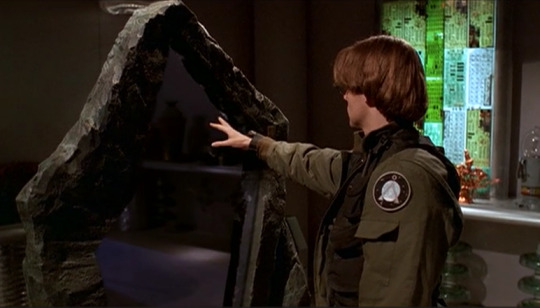
One of my favourite episodes titles of the series, also kicking off what is essentially a four episode arc to end season 1 and kick off season 2. 90’s tv was the eternal battle between episodic and arc-based storytelling, and I actually think the show threaded the needle quite well.
I do love an alternative universe episode, back in the beforetimes when a multiverse served a story purpose and not just a fodder for fanservice of the “your favourite character, and they’ve got a new hat!” variety.
The story credit for this episode is David Kemper, an Executive Producer for Farscape, but this is his only Stargate contribution. Robert C Cooper wrote the teleplay, and the episode was directed by David Warry-Smith, his first of 11 for the show.
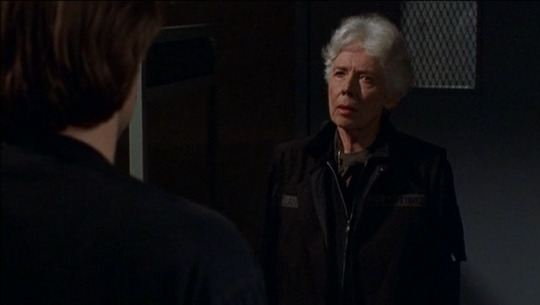
Love that they brought back Catherine, Elizabeth Hoffman is great (RIP). Given that Jack is a general in this timeline, perhaps we can assume he kept her on the project as opposed to the main timeline’s General West shutting things down/sidelining her after Abydos?
But Jack still went on the Abydos (suicide) mission so presumably wasn’t a general at that time. I know we have to be la la la don’t think about it with the alternate timelines but I’m so curious how things went down in this universe!
How long did it take them to work out how to use the gate without Daniel’s help? I guess they couldn’t communicate with the Abydonians without Daniel but they still were able to kill Ra - how? If they never went to Chulak what triggered Apophis’s interest in them to mount an attack on Earth? Why is the attack in this universe before the attack in the prime universe when really the events should be delayed in the AU?
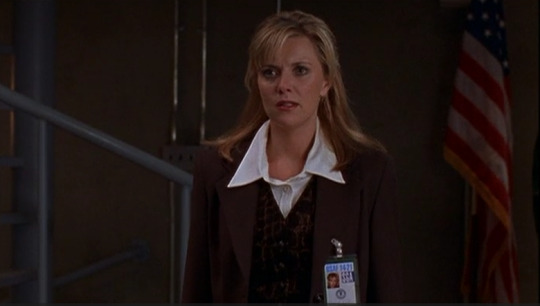
This is a decent wig for Sam. Sadly, the only decent wig she’ll get the entire series.
I also wonder what was the difference in this universe so Sam didn’t join the Airforce.
Daniel guilelessly giving the address for Chulak right after taking about Jack intending to blow up Abydos. He’s so used to his Jack whose come so far since then, never even thinking that alt!Jack may not have, and what they might want the coordinates for.
lol, Daniel walks down the stairs, crosses the room, looks at the map, then puts on his glasses.
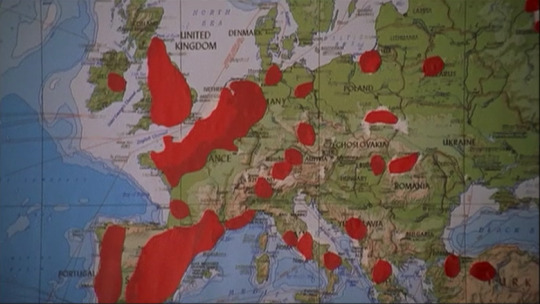
“Every one of those red dots is a destroyed city.” Apophis a fan of the United Celtic Nations it seems.
Daniel finally twigs that he might be in an alternate reality (with Sam defining it for him), but we can’t be too harsh, he canonically has zero pop culture game and this was the 90’s. Even in todays over-saturation of multiverse content Daniel would probably still have no clue.
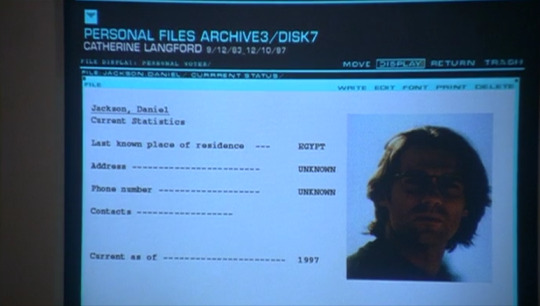
They made a decent attempt at Spader!Daniel with this pic!
Daniel and being dead/missing in alternate realities/timelines, name a better duo.
It is interesting that in a lot of the AUs the show explores, Daniel’s lack of involvement in the Stargate program coincides with that universe being doomed.
I forgot that the 38 minute gate window was first established in this episode! That’s a huge piece of lore originating in an alternate universe.
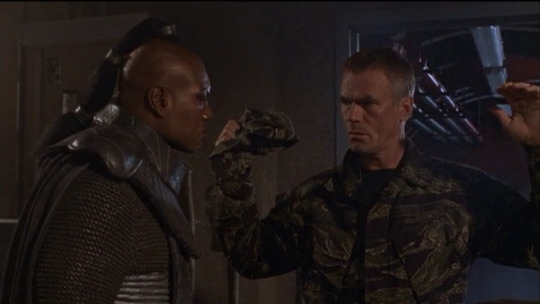
It wouldn’t be an alternate universe without at least one character with silly hair.
Generally I prefer AUs that explore character rather than ones used to advance plot (or are lazy fanservice looking at you mcu), and while the primary purpose of this episode is to give Daniel forewarning of the Goa’uld attack and the gate address to the source, there is some nice stuff here especially around Jack and Teal’c.
Because at their core alt!Jack and alt!Teal’c are still the same - Teal’c still hates the Goa’uld, Jack is still willing to take big risks on his instincts, and there’s a mirror to Children of the Gods where Jack reaches out to Teal’c, but it’s a dark mirror, and it’s the little differences that matter because Jack isn’t the same person as the one in CotG, who went through the Abydos mission with Daniel and came out a better person, instead he’s the one that sent the bomb that killed Teal’c’s family, and it dooms them both.
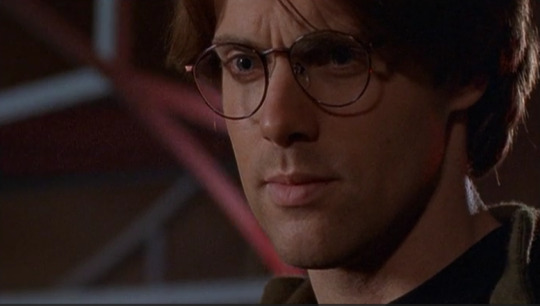
Opening credits shot!
“I also wish to blow us all to hell.” Alt!Sam is a badass. No difference to prime!Sam there.
There’s also an interesting moment between Teal’c and Daniel in the gateroom - Teal’c doesn’t shoot straight away when he could have, so maybe Jack telling him of the alternate universe where Teal’c was fighting the Goa’uld got through. He still fires as Daniel runs for the gate, but only hits him in the shoulder - at such close range Teal’c could probably have made the kill shot. His hesitation saved Daniel’s life, and ultimately the life of his other self.
Because Daniel’s presence in the other reality changes nothing for it - alt Jack, Sam, Teal’c and Catherine all still die, the Stargate is destroyed and that would have happened anyway (with maybe the exception of Jack being able to stall Teal’c to set the self destruct).
But Daniel’s changed - there but for the grace of god (or fate) go our team.
21 notes
·
View notes
Text
Netflix’s ‘Avatar: The Last Airbender’ Showrunner Albert Kim to Step Down, Jabbar Raisani and Christine Boylan to Lead Final Two Seasons
Netflix’s live-action “Avatar: The Last Airbender” series is undergoing a change in leadership.
Variety has learned that Albert Kim, who developed the series and served as showrunner on Season 1, is stepping down. Christine Boylan and Jabbar Raisani will lead the show as executive producers going forward. Netflix has already announced the show has been renewed for two more seasons, concluding with Season 3.
Boylan served as co-executive producer on Season 1 of “Last Airbender,” while Raisani was an executive producer, director, and a VFX supervisor. Kim will remain onboard as an executive producer for Seasons 2 and 3. According to an individual with knowledge of the situation, Kim wanted to explore new opportunities following the multi-year development process on “Last Airbender” and has signed a deal with Disney to work as an executive producer on the “Percy Jackson” series while also developing new projects for that company.
Boylan’s other credits include the hit Peacock series “Poker Face” as well as shows like the Netflix-Marvel series “The Punisher,” “Citadel” at Amazon, and “Cloak and Dagger” at Freeform. She is also an accomplished playwright, recently debuting her sci-fi play “Analogue” in London, as well as a comic book writer for DC, Marvel, BOOM Studios, and Tokyopop.
She is repped by WME, Art/Work Entertainment, and attorneys Erik Hyman at Paul Hastings.
In addition to his work on “Last Airbender,” Raisani has done VFX work on shows like “Lost in Space” and “Stranger Things” for Netflix as well as “Game of Thrones” and “The Flash” among many others. He has also directed episodes of “Lost in Space” in addition to episodes of “Last Airbender.”
He is repped by CAA and Myman Greenspan.
“Last Airbender” is based on the iconic Nickelodeon series of the same name. The live-action version’s first season starred Gordon Cormier, Kiawentiio, Ian Ousley, Dallas Liu, Ken Leung, with Paul Sun-Hyung Lee, and Daniel Dae Kim.
Along with Albert Kim and Raisani, Dan Lin and Lindsey Liberatore executive produce on behalf of Rideback, with Michael Goi also executive producing. Goi directed the first two episodes, while Raisiani directed episodes three and four. Roseanne Liang directed episodes five and six, with Jet Wilkinson directing the final two episodes of Season 1.
#natla#atla#netflix avatar#avatar the last airbender#netflix atla#avatar netflix#atla netflix#albert kim#jabbar raisani#christine boylan#variety#article
14 notes
·
View notes
Note
You mentioned yesterday when answering my 1-3 review-ish that all the Chapter 5s bar one would be quite low down the list so seeing 3-5 here, doesn't really surprise me all that much because this has a LOT of flaws with it.
And given the history behind this chapter its little surprise as out of all the V3 Chapters, 3-5 suffered the most development hell of them all as Kodaka and everyone at Spike Chunsoft struggled really hard to come up with a good Chapter 5, and there were lots of drafts and revisions each with wildly different outcomes. The only recurring theme between each version was that the victim and culprit worked together. So if you are wondering why Kaito and Kokichi feel out of place as a victim/culprit pair, that's why because there was a good chance neither of them were meant to die this chapter but after slamming their heads against the wall enough times, this is what we got. I am curious what the other alternatives we could have gotten were but short out of a data breach I don't encourage under any circumstances, I doubt we would ever find out.
As you mentioned a big issue is this is a reskin of 2-5 but its a way inferior version since Kokichi is not Nagito. Nagito is a creditable threat because we've seen many examples on how willing he was gonna go for his ideals, and he also makes it very clear if he likes you or not. Plus Nagito had just found out the truth about Class 77-B being the Remnants of Despair so there was a motive for his anger. With Kokichi it felt like since everyone hated him after what he did last Chapter he decided to go "fuck it" and go completely crazy.
Another major difference between Nagito's and Kokichi's plan was Nagito had thought out his plan well and made it so it became almost impossible to solve since anyone could have thrown the poisoned fire grenade. The only way there were gonna win is to weed out the traitor which only works because Nagito would view the traitor as the only innocent, and this meant Chiaki had to expose herself to ensure Nagito's plans failed. But all of this can be saved for 2-5. Kokichi's plan though had nurmous holes in it since yes he drove everyone to despair but all the Mastermind had to do was use a Flashback Light to give them hope and that brought everyone's spirits up. Plus kidnapping Kaito was always gonna be a poor move since we all know someone who is very attached to Kaito and who would not hesitate to delete Kokichi from existence if given the chance, so does it really come as a surprise when Maki decides to try and rescue Kaito on her own, and kill Kokichi in the crossfires?
And while Kokichi making a unsolvable crime is a good idea on paper, in reality seeing as Team Danganronpa would do anything to keep the show running, plus there was already a case of the culprit being the wrong person with 3-1, so they would just execute whoever was in the exicel regardless of if its true or false because the producers don't care, they just want a good show. And even if everyone was killed in Chapter 5, there's a good chance it would have made the show even more popular, because there was evidence that Danganronpa was getting stale in the V3 universe as you would expect from such a long running show. So having it so everyone died in one chapter in a unsolvable case, that would have brought a lot of in-universe discussion and it might lead to Team Danganronpa changing the format slightly so that more scenarios like what Kokichi's plan was would come out like making more disruptive characters like him. Far from stopping the Killing Game, Kokichi's plan would have benefitted it more then anything.
I think there should have been more emphasis on Kaito's illness rather then it be a throwaway but once again since 3-5 has been muddled around so much, it could have been that some scenarios would have had the illness be more of a factor and Kaito dropping dead during the trial or something. What's worse is that Shuichi and Kaito have a bit of a fallout in 3-5 due to the previous class trial and while Maki tries to help patch things up, I'm not really sure if this conflict was ulitmately resolved satisfyingly, I know Kaito does apologise to Shuichi when he secretly visits him while being held captive, but given Kaito was under watch from Kokichi at the time, its not sure if its sincere though the fact he gives Shuichi words of encouragement before he dies means I do think the bridges have been mended but I dunno I wish it was done better.
Another thing is due to how confusing 3-5 is, a lot of people have ran conspiracy theories that Kokichi didn't even die, since due to how the whole trial was run and how compliant Kaito seemed to be, it could be Kokichi was just hiding afterwards and him being alive explains the plothole of how the auidence seemed to comply at the end because Kokichi hacked into the broadcast signal and turned it off so nobody could vote. And while people give all kinds of evidence and its a interesting theory, its one I don't buy because I just believe its wishful thinking from Kokichi fans that he is still alive.
The whole Gopher Project fake storyline was also kinda meh as while its revealed to be completely fake, its like how do people not notice a swarm of meteorites heading towards Earth with space COVID in them? I know Bubbles played with this in Starship of Hope by explaining its caused by a rogue planet going through the Kulper Belt which made the astariods go crazy, but still we have eyes on space all the damn time, sure we sometimes miss a asteroid or two but not an entire swarm of them. That's kinda hard to NOT notice and also how come Jupiter doesn't do its job and mess with the flight path of a lot of them? Really you could tell the plan is bogus and fake and really the only logical conclusion I can see is that its terrorism and a group similar to Ultimate Despair hijacked the meteorites and just yeeted them at Earth. Kinda glad it wasn't real in all fairness.
Another issue here is the Maki-Kaito relationship. This is one of the few "canonical" pairings as Maki more or less admits in this chapter she has developed feelings for Kaito and its what drives a lot of her actions since she just wants Kaito to be okay. And that's fine because love can make people do stupid and crazy things, but it wouldn't be what Kaito wanted from Maki. As the entire character arc between Kaito and Maki is the former wanting to show the latter there is more to life then being a merciless monster, and that she is a person with thoughts and feelings. So if the entire character arc is for Maki to learn to be her own person, then why does she decided to go and try to do a dramatic rescue to save Kaito and kill Kokichi in the process? Especially since Shuichi and co already made plans to rescue Kaito and confront Kokichi the following day so why does Maki decide to go rogue when there was already a plan in the works?
And I know the easy way is that Tsumugi made Maki do it, but since we have never seen Tsumugi do something like that in V3 and if anything she was panicking big time during the entire chapter which makes it seem she's lost control and recieving hell from her superiors. Her statement in Chapter 6 it was part of the plan I suspect was an lie to save face because looking how she reacts in Chapter 5, its very telling that she's lost control of the situation.
I am reminded of the fake spoilers of Chapter 5 which gave some interesting alternatives that we could have gotten. One of these fake spoilers is the reveal that Kokichi was born into a cult of Despair and was groomed to be its leader...and all the horrific implications that follows. The characters find out about this in Chapter 5 and they confront Kokichi who goes completely crazy as a result due to the trauma involved as it turns out the reason he lies all the time is as a defensive measure for what he had to endure. So Kaito decides to kill Kokichi because everyone assumes he's the mastermind, but midway through Kaito killing Kokichi, he realises that Kokichi isn't the mastermind but its too late as a fatal blow was dealt. Kokichi though is happy since it means at long last, someone believed him and he dies condent. Kaito then takes Kokichi's body and crushes it under the hyderelic press so in the fake spoiler, he was already dead when the press went down, and then he had to rush to the trial to stop Monokuma from trying to frame Maki as the blackened and then he implores everyone to vote him.
The trial itself is fun because you don't know who the victim and culprit is but the problem and its another plot hole, is that Kokichi apparantely wrote an entire script for Kaito to act like him. Thing is he wasn't able to gloat Kaito into helping him until after Kokichi got fatally poisoned by Maki who if he did, would mean Maki gets killed, and when you are slowly dying from poison you don't have enough time to write 5,000 words on how to speak Kokichi. I mean I probably could do it in about 5 hours, but I use a computer, Kokichi would have had to write this all out which takes longer. You could argue that maybe Kokichi had this written in advance but how was he gonna convince Kaito, who btw hates his absolute guts and was only helping him because if he didn't one of the people he cares about the most would die. And it also implies Kokichi has Ultimate Analyst like abilities which again is something we haven't seen from the character.
Long story short, while the trial had good emotions and it led to a interesting case, the fact that this was apparently a pig for Spike Chunsoft to figure out how to write it shows, because they wound up doing a rehash of 2-5 but missing a lot of its good marks and leaving behind a lot of plotholes and stuff that doesn't make sense. Maybe if Chapter 5 wasn't so much of a brain fart for Kodaka, maybe the case could have had more consistancy and be stronger overall. But as it stands, we are left with a chapter which has a lot of flaws and plotholes and a scheme that was doomed to fail due to the nature of the Killing Game.
Sadly, this won't be the only time a chapter gets slaughtered by edits and changes which wrecks the entire narrative, but I see that one being way more severe as it happened literally at the last minute. But you see which one I'm referring to when we get there.
//First of all, I'm really sorry I didn't answer this yesterday. I always look forward to your reviews, but yesterday I was preoccupied with personal matters.
//I had some friends over for the week to celebrate my birthday that happened at the beginning of the month. And I create all of these posts in advance, so it just uploaded on its own without me needing to do anything.
//But I'll talk my way through this now. To start with, I'm gonna be real, if I ever had the chance to talk with Kodaka and his team, and we got to talking about Case 5, now that I know what was going on at the time, I think I'd have nothing but kind words for the man.
//Yeah, okay, I don't think I would try to hide all the issues that I talked about with V3-5, but if this really was under the constraints as you've described them, I think what we actually got is pretty freaking fantastic.
//Again, I LIKE this case. I just have very prevelant cons with it that kind of balance out the pros. While I do really like the alternate scenarios that you talked about here, if I'm being real, I still think I prefer what we actually got as opposed to them.
//In terms of comparison to 2-5 though, it's very easy to pinpoint exactly why it falls so flat. And the main reasons all have to do with the masterminds behind the plan.
//Let's just say that there's a reason why there are so many videos and posts out there trying to pschoanalyse Komaeda. Because not only is it a fun and interesting thing to do to try and explain the actions of this madman, and debate whether or not it's justifiable to do so, but it's rewarding to as well, regardless of what conclusion you reach.
//Nagito's motivations are flawed and nonsensical, but they are also logical. He's had such a rough life that constantly teeters on and off collapse due to his batshit luck that he cannot control, so the reason why he's crazy is because he tries to ground himself with whatever he can. It's like a coping mechanism, and it makes him do insane things.
//He loves hope because he fears despair, and as stated here, the simple reason why he did what he did in Case 5 is because he had a reason to want to go after everyone else. He found out that the Future Foundation were the good guys, and the students were the bad guys, which is why a switch was flipped that made him set up the trap as intended, and it's genius.
//But Kokichi isn't the case. Psychoanalysing him is almost impossible, because he's both too simple AND too complicated.
//The short version is that he's just a pathological liar, but Kokichi throughout all of his spiels about how lies and truths can change, he never actually gives a reason why he lies; at least not an honest one. And when he dies, even Shuichi says that they will never find out what's really going on through his head.
//And neither do we. And we likely never will.
//On the one hand, Kokichi being left as such an open book for people to make their own interpretations is cool, but at the same time, it just stirs conflict, because everyone can kind of agree that Nagito's psychology comes from a singular place, largely because of how straightforward he is as a character.
//Kokichi is complex for the sake of being complex, and it doesn't really work in his favor for this case.
//But yeah, Kokichi's plan to create an unsolvable crime in Chapter 5 could have made the show more popular, completely going against what he tried to do to end the game. What's worse, as I mentioned, it is really taken away what Kokichi tries to do when Tsumugi stands on ceremony and tells everyone she predicted he would attempt this, because she wrote his character.
//Assuming that's true, which lets be real, it probably isn't, but assuming it is, that really means that this whole trial was just overall worth absolutely nothing. Despite how much they try to play up Kaito's sacrifices as noble, Kokichi was trying to destroy a power that he didn't fully understand.
//Nagito knew, when he was dying, what was really going on in the virtual world, and formed his plan surrounding that. Kokichi had no idea what he was up against, tried it anyway, and played with fire. While that's not out of character to him, Kokichi is more methodical than he lets on. Everything he does means something in the grand scheme of things, as Chapters 4-6 really try to show.
//So it just kind of sucks that it turned out this way.
//What I will say though is that in regards to Shuichi and Kaito's falling out, it does make sense how that one quick conversation was enough to fix it.
//Not only was the situation desperate at the time, but I don't think Kaito was ever THAT mad at Shuichi.
//Kaito, contrary to what people might think, ISN'T an idiot. He KNOWS that if Shuichi hadn't exposed Gonta, they would have all died. But it ties in with his belief that no matter what, he could not believe that Gonta would be cruel enough to commit a murder on his own. And he was kind of right, considering Kokichi masterminded most of Case 4.
//Shuichi is not to blame for what happened to Miu and why Gonta turned out the killer. But that doesn't stop him being angry about it, and just taking it out on Shuichi because he's basically the only one that he can anymore.
//That doesn't make it right, let me just quickly add. It's still stupid of Kaito to do that. I just think it would be in-character for him to realize such himself, but unable to prevent himself from lashing out about it because it upset him that much.
//In his defence, V3-4 was VERY upsetting.
//Next, the Kokichi conspiracy theory, while cool, probably isn't accurate either. Because there would be no reason for him to hide away like he did, because again, he would not have known about V3 being a TV show.
//Also, in regards to Maki, I'm not going to defend her actions, because they were still stupid, but you have to remember that Maki, while agreeing to the rescue, had a few reasons why she went on her own. The most likely circumstance is that everyone agreed to go save Kaito in the hangar, but Maki probably realized that while everyone was willing to fight Kokichi and the Exisals, none of them were probably willing to kill him.
//She on the other hand, for lack of better words, needed that twink OBLITERATED.
//Also, what the hell was she going to do? Go back and admit that she might have killed both Kokichi and Kaito? So yeah, it was stupid, but the reason why Maki went off on her own is because she probably felt she couldn't trust the others, and at this point in time, she didn't care anymore. Kokichi had crossed every line and she wanted him DEAD.
//Also, I really don't think that Tsumugi had anything to do with Maki's actions, because Maki would have SAID so in Chapters 5 or 6. She could have gone "Wait, but that reminds me...Back when I was trying to rescue Kaito in the hangar, it was Tsumugi who said blah blah blah..." you get the idea.
//But we never got that, and come on. Tsumugi doesn't do a single damn thing that's remotely mastermind-like for the entire Killing Game, besides killing Rantaro and framing Kaede, which we don't even discover until Chapter 6. It's pretty unlikely of her to do it now of all times.
//I think there were also other ways that Kokichi could have convinced Kaito of what was going on. All he had to do was show him the proof that he WASN'T the mastermind, and that his tools were created by Miu, and explain that his plan is to end the Killing Game.
//In fact, Kaito even ADMITS at the end of the trial "I was on board the moment he told me he wanted to end the killing game."
//Like, Kaito SAYS this EXACTLY!
//The fact that Kokichi was able to goad him into it with the poison cure was pure luck more than anything. Despite how much Kaito hated Kokichi, and does so until his own death, I doubt it would have taken that much to convince him to help end the game, even if it meant making a sacrifice.
//But yeah, like I said already, it is honestly kind of surprising looking back how people remember Case 2-5 so fondly that they fail to realize just how much greater it is than 1-5, V3-5, and I would argue A-5 and A2-5 didn't really hit that mark either.
//Unlike Case 3, none of them are BAD. Not even this one. It's still very good and very fun. They just aren't universally fantastic. But we have a whole rest of a list for that to get to soon enough.
-Mod
3 notes
·
View notes
Text
Loki keeps things moving in its second season as the God of Mischief (Tom Hiddleston) headed to the World’s Fair in 1893 Chicago alongside Mobius (Owen Wilson).
Following a ping on Ravonna Renslayer’s (Gugu Mbatha-Raw) TemPad, Loki and Mobius search for something out of the ordinary and wind up at a demonstration being put on by Victor Timely (Jonathan Majors), one of He Who Remains’ variants, where Ravonna is also in attendance with a hidden Miss Minutes (voiced by Tara Strong).
Unlike past reconnaissance missions completed with Mobius, Loki has the upper hand as he and Sylvie (Sophia Di Martino) were the ones who met He Who Remains and would be able to more easily spot his variants. “In Season 1, it was really helpful to have him on the back foot because it allowed him to go on this really unexpected journey of growth,” executive producer Kevin Wright tells TV Insider. “We’ve seen him be redeemed, we’ve seen him be a villain, we’ve seen him be an anti-hero. He’s kind of flirted with heroism. But I think our show really lets him start wandering down that path to do it.”

(Credit: Gareth Gatrell/© 2023 MARVEL)
In order to get to Victor after his presentation to a captivated audience at the Fair, Loki uses his magic to clear his path, removing a volatile attendee with a flash of green light and smoke, and that’s just a fraction of the magic put to use in the episode. “The TVA is a bad organization in a lot of ways. They completely broke him down, but it set him on this new journey now,” Wright teases Loki’s path forward.
“And I think that that’s exciting. And the thing that we talked a lot about going into this season was the magic. Through the MCU, we haven’t seen him use it a lot, or if he’s using it, he’s using it for tricks and mischief and all this,” Wright continues. In this case, he’s using it as a tactical device.
Just as Loki and Mobius intercept Ravonna and introduce themselves to Victor, they’re alerted to TemPad activity nearby, which turns out to be Sylvie, who is determined to kill Victor as she vows to murder all of He Who Remains’ variants. This leads to a magical face-off with Loki as he tries to prevent such an occurrence, knowing he and Mobius need Victor’s temporal aura in order to try and fix the temporal loom holding the sacred timeline together.
“He’s a character who has not lived up to his full potential yet,” Wright adds of Hiddleston’s Loki. “And that was the exciting journey for us in Season 2 was we want this Loki to become the best version of himself. And something that Tom would say was like, ‘You cannot become the best version of yourself in life until you really embrace your past and who you are, and fully kind of reckon with your being and the things that you’ve done and what you want to do.'”
Wright notes it isn’t just about being a “good guy now,” Loki’s journey is about “Finding yourself in a constant journey, and we wanted this season to be that. Each step along the way, you’re starting to see a progression of Loki, and the magic is a fun way to show that.” Viewers also see the God of Mischief’s growth. “Through the way he carries himself, you’re seeing him become a real leader in some ways,” Wright continues. “It was just something that felt natural to the story, but also, luckily, I think it’s something the fans desperately want to see as well.”
See how Loki continues to move towards hero status as Season 2 continues, and let us know what you think of the latest developments in the time-traversing Marvel series below.
22 notes
·
View notes